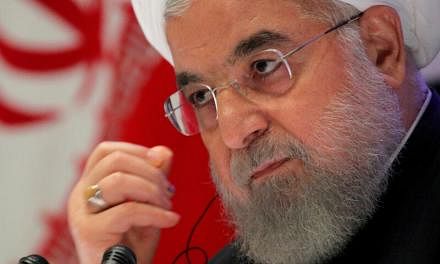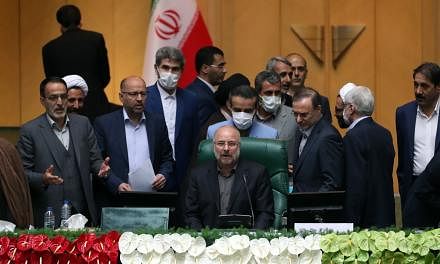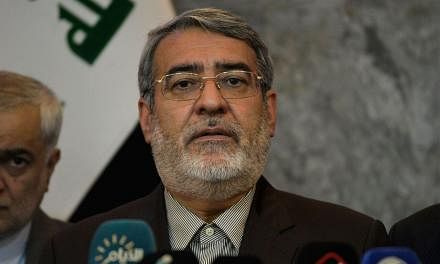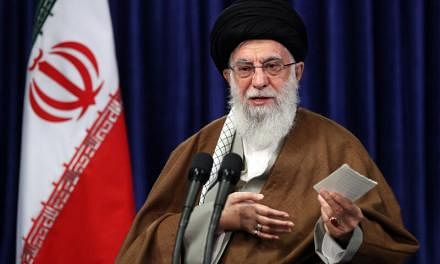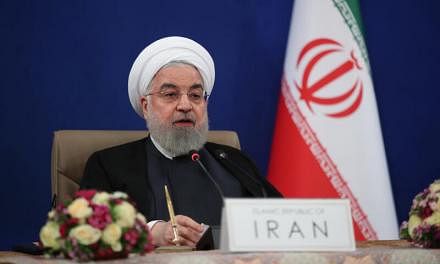WASHINGTON (REUTERS) - Trump administration officials will brief the US Congress on Wednesday (Jan 8) on the killing of an Iranian commander that has sparked a new Middle East crisis, as Democrats push for legislation to rein in the President's ability to launch a war.
Secretary of State Mike Pompeo, Secretary of Defence Mark Esper, Joint Chiefs of Staff Chairman Mark Milley and CIA Director Gina Haspel will address the House of Representatives behind closed doors at 1pm EST (1800 GMT) and the Senate at 2.30pm EST (1930 GMT), five days after a US drone strike that killed elite Quds Force commander Qassem Soleimani in Iraq.
The briefings will come just hours after Iranian forces fired missiles at military bases housing US troops in Iraq, in retaliation for the killing of the Iranian general, raising the stakes in its conflict with Washington amid concern of a wider war in the Middle East.
President Donald Trump broke precedent by failing to inform congressional leaders before ordering last week's drone strike.
And he angered some lawmakers, particularly Democrats, by making classified his formal report to Congress about the strike as he sent more troops to the Middle East.
The US Constitution grants Congress, not the President, the right to declare war. Some lawmakers have been trying for years - under Democratic President Barack Obama as well as under Mr Trump - to wrest back that authority from the White House.
The Democratic-controlled House may pass legislation this week that would require the removal of US forces from hostilities with Iran within 30 days, unless Congress declares war or authorises the use of military force.
A similar measure has been introduced in the Senate, which is controlled by Mr Trump's fellow Republicans who rarely oppose his initiatives, dimming its prospects of passage.
Mr Esper told journalists on Tuesday that Major-General Soleimani was planning an attack that threatened US interests, which was to be executed within days rather than weeks.
Lawmakers have demanded more information, including public testimony, about any threat from Iran and the military's response.
In a letter released on Wednesday, top Senate Democrats asked Mr Esper and General Milley for regular briefings and documents about any troop deployments.
And on Tuesday, the Democratic-led House Foreign Affairs Committee called on Mr Pompeo to testify about Iran in public next week.
The strike against Maj-Gen Soleimani prompted retaliation by Teheran.
Iranian state television said Iran had fired 15 ballistic missiles from its territory at US targets in neighbouring Iraq on Wednesday. The targets were the Al-Asad air base and another facility in Erbil, the Pentagon said.
One source in Washington said early indications were that there were no US casualties, while other US officials declined to comment.
Teheran's foreign minister said Iran took "proportionate measures" in self-defence and did not seek to escalate the confrontation.
Mr Trump, who planned to make a statement on Wednesday, gave an initial response on Twitter late on Tuesday, saying: "All is well!"
As tensions have risen, some lawmakers have accused Mr Trump of inadequately considering the consequences of ordering the drone strike.
Democratic Senator Bob Menendez said the result of the strike against Maj-Gen Soleimani was "Confusion, contradictions, chaos", with Iraq voting for the removal of US troops and uncertainty about the future of the fight against Islamic State in Iraq and Syria (ISIS) militants.
"The President must come to Congress and present clear and compelling evidence as to why the strike against Soleimani was absolutely necessary. What was the imminent threat that Soleimani uniquely possessed?" Mr Menendez said in a Senate speech.


